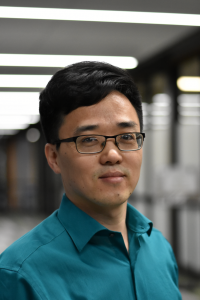
Peng Li
Title:
When Federated Learning Meets Graphs: Chances, Challenges and Solution
Abstract:
Federated learning has shown great promise in enabling collaborative machine learning among distributed devices while preserving their data privacy. There is a growing amount of research efforts on federated learning, but they study Convolutional Neural Network (CNN) models that show superior learning accuracy on image and voice data. However, many applications generate graph data (e.g., social graphs and protein structures) consisting of nodes and edges, and much evidence has shown that CNN cannot efficiently handle graph learning. Graph Convolutional Network (GCN) has been proposed to deal with graph learning by a novel graph convolution operation. Different from CNN’s convolution operation that filters a small set of neighboring pixels, a graph convolution operation filters the features of neighboring nodes. Unfortunately, existing work of federated learning mainly focuses on CNN, leaving GCN under explored. This talk will present the technical challenges of federated graph learning, from the perspectives of computation and communication infrastructure. We will also present our latest achievements about how to address these challenges.
Bio:
Peng Li is a Senior Associate Professor in the University of Aizu, Japan. He received his BS degree from Huazhong University of Science and Technology, China, in 2007, the MS and PhD degrees from the University of Aizu, Japan, in 2009 and 2012, respectively. His research interests mainly focus on wired/wireless networking, cloud/edge computing, Internet-of-Things, distributed AI systems. Dr. Li has authored or co-authored over 100 papers in major conferences and journals. He won the Young Author Award of IEEE Computer Society Japan Chapter in 2014, the Best Paper Award of IEEE TrustCom 2016 and the Best Paper Award of IEEE Communication Society Big Data Technical Committee in 2019. He supervised students to win the First Prize of IEEE ComSoc Student Competition in 2016. Dr. Li won the 2020 Best Paper Award of IEEE Transactions on Computers. Dr. Li is the editor of IEEE Open Journal of the Computer Society, and IEICE Transactions on Communications. He is a senior member of IEEE.

Qing Yang
Title:
Enabling Machine Learning based Cooperative Perception for Autonomous Vehicle Safety
Abstract:
By understanding what and how data are exchanged among autonomous vehicles, from a machine learning perspective, it is possible to realize precise cooperative perception on autonomous vehicles, enabling massive amounts of sensor information to be shared amongst vehicles. Such an advance can be extremely useful to extending the line of sight and field of view of autonomous vehicles, which otherwise suffers from blind spots and occlusions. The extended field of view on autonomous vehicles might be beneficial at times where there are occlusions preventing a complete perception of the environment. This increase in situational awareness promotes safe driving over a narrow scope and improves traffic flow efficiency over an extended scope. As multiple vehicles view the same object, an attempt to mutually check the sensor results on individual vehicles becomes possible, which enables an automatic on-road sensor inspection, facilitating efficient vehicle maintenance and reporting service. With cooperative perception, it might be possible to construct crowdsourced HD maps that are updated by the sensor data produced by individual vehicles, which also use the updated map for precise localization and navigation. Establishing cooperative perception among autonomous vehicles will not only change the way we think about the perception system on autonomous vehicles, but could also open up opportunities to design novel systems that were previously inconceivable. The talk will focus on understanding the sensing and communication challenges to achieving cooperative perception among autonomous vehicles, and then, using the insights gained, guiding the design of the suitable format of data to be exchanged, data fusion algorithms on vehicles, and efficient vehicular communications.
Bio:
Qing Yang is an Associate Professor in the Computer Science and Engineering department at University of North Texas. He works on connected and automated vehicle technology, with research interests focused on cooperative perception.

Pengyuan Zhou
Title:
Vetaverse: Building Metaverse for Vehicles and Transportation Systemstion
Abstract:
Metaverse, envisioned as a blended reality-virtual realm, became popular in 2021. Building a metaverse for vehicles and transportation systems with extended reality technologies can provide an immersive user experience for drivers and passengers. Realizing a seamless metaverse experience in such a dynamic mobile environment faces numerous challenges, such as efficiency, privacy, and fairness. This talk will discuss recent studies to elaborate on this futuristic trend.
Bio:
Dr. Pengyuan Zhou is currently a research associate professor at University of Science and Technology of China (USTC). He was an EU Marie-Curie ESR and received his PhD from University of Helsinki, Finland in 2020. His research interests include ubiquitous computing and metaverse.

